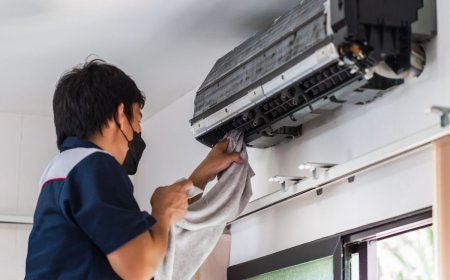Understanding Your Rights as a Tenant Facing Housing Disrepair Issues

As a tenant, you have certain rights when it comes to the condition of your rental property. Landlords have a legal responsibility to ensure that the property is safe, habitable, and well-maintained. If you're facing housing disrepair issues like damp and mould, pest infestations, water leaks, broken heating systems, or damaged windows and doors, it’s important to understand your rights and the actions you can take to protect yourself. Not only can poor living conditions impact your health and quality of life, but they can also violate your legal rights as a tenant.
Understanding Housing Disrepair
Housing disrepair team refers to situations where your landlord has failed to maintain the property in a safe and livable condition. This includes a range of issues, from damp and mould problems that can lead to respiratory issues to broken heating systems that leave you without warmth in cold weather. Other common disrepair issues include leaky roofs, broken windows and doors, and pest infestations. Regardless of the specific problem, your landlord is legally required to make sure that the property is in a good state of repair and meets the health and safety standards set by local authorities.
If you are living in a rental property that is experiencing any of these issues, it's essential to address the problem promptly. In some cases, these issues can escalate, causing further damage to the property and posing risks to your health and wellbeing.
Tenant Rights and Housing Disrepair Compensation Claim
As a tenant, you have the right to live in a safe, secure, and well-maintained property. If your landlord fails to make necessary repairs or address issues within a reasonable timeframe, you may be entitled to make a housing disrepair compensation claim. This claim can help you recover compensation for the inconvenience, harm, or discomfort you’ve experienced due to the disrepair.
The first step in making a housing disrepair compensation claim is to formally notify your landlord or letting agency about the issues in writing. This can be done through a letter or email that clearly outlines the problem, the date it was first noticed, and the impact it is having on your daily life. It’s also a good idea to keep a copy of this communication for your records.
If your landlord fails to take action within a reasonable period (usually 14 days), you may have grounds to make a formal complaint to the local council or take legal action to force repairs. A compensation claim can help cover any loss of comfort or additional costs you’ve incurred, such as increased heating bills due to broken heating systems or medical expenses from health issues caused by damp and mould.
Legal Protections for Tenants Facing Housing Disrepair
Under the law, tenants are protected by the Landlord and Tenant Act 1985, which outlines the landlord’s obligation to maintain the property in good repair. If your landlord is failing to carry out necessary repairs, you have the right to seek assistance through your local council or take legal action.
Local authorities can issue an enforcement order that forces the landlord to carry out repairs. This is often used in cases where the property is unfit for habitation, such as severe mould infestations or a heating system failure during winter. If the landlord still refuses to make the repairs, you may be able to claim compensation for the inconvenience and distress caused by living in a substandard property.
In some cases, tenants may also be entitled to a rent reduction if the disrepair significantly affects the living conditions. This is particularly relevant for issues that make the property unsafe or uninhabitable, such as the lack of hot water or heating or exposure to dangerous electrical faults.
The Importance of Documenting Housing Disrepair
When facing housing disrepair issues, it’s crucial to document the problems in detail. Keep a record of the issues, including photographs or videos of the damage. This evidence will be essential if you decide to pursue a compensation claim or take legal action. Be sure to note the dates when you reported the issues to your landlord and any responses you received.
If possible, obtain written reports from independent experts, such as surveyors or health professionals, to further substantiate your claim. This can strengthen your case when negotiating compensation or seeking legal action. Additionally, keep copies of any invoices or receipts for costs incurred due to the disrepair, such as repair costs, increased utility bills, or medical expenses.
Taking Action Against Your Landlord
If you have reported housing disrepair issues to your landlord and they have failed to act, there are several steps you can take. Firstly, contact your local council’s environmental health department. They have the power to investigate your case and may issue an enforcement notice to your landlord if they find the property is in disrepair.
Secondly, you can contact a solicitor who specializes in housing disrepair claims. They will be able to guide you through the process of making a compensation claim and help you obtain the compensation you're entitled to. In some cases, you may be able to pursue the claim without incurring any upfront costs, as some solicitors offer no-win, no-fee arrangements.
How Housing Disrepair Affects Your Health and Wellbeing
Housing disrepair issues can have serious consequences for your physical and mental health. For example, living with damp and mould can lead to respiratory problems, allergies, and asthma. Inadequate heating can cause cold-related illnesses, particularly during the winter months, while pest infestations can cause stress and anxiety.
These health issues can be compounded by the stress of dealing with an unresponsive landlord or the inconvenience of living in substandard conditions. If your health has been affected by housing disrepair, you may be entitled to additional compensation for the impact on your wellbeing.
Conclusion
As a tenant, you have the right to live in a safe and habitable property. If you're facing housing disrepair issues, it’s important to know your rights and take action to resolve the problem. By documenting the issues, reporting them to your landlord, and seeking legal advice if necessary, you can ensure that your landlord meets their obligations and that you receive any compensation you’re entitled to.
If you are currently experiencing housing disrepair issues, Housing Disrepair Team is here to help. Our team specializes in guiding tenants through the process of making a housing disrepair compensation claim, ensuring that your rights are protected and that you receive the compensation you deserve. Don’t hesitate to contact us for expert assistance in resolving your housing disrepair issues.
































































